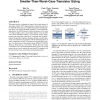Free Online Productivity Tools
i2Speak
i2Symbol
i2OCR
iTex2Img
iWeb2Print
iWeb2Shot
i2Type
iPdf2Split
iPdf2Merge
i2Bopomofo
i2Arabic
i2Style
i2Image
i2PDF
iLatex2Rtf
Sci2ools
DAC
2009
ACM
2009
ACM
Improving STT MRAM storage density through smaller-than-worst-case transistor sizing
This paper presents a technique to improve the storage density of spin-torque transfer (STT) magnetoresistive random access memory (MRAM) in the presence of significant magnetic tunneling junction (MTJ) write current threshold variability. In conventional design practice, the nMOS transistor within each memory cell is sized to be large enough to carry a current larger than the worst-case MTJ write current threshold, leading to an increasing storage density penalty as the technology scales down. To mitigate such variabilityinduced storage density penalty, this paper presents a smaller-thanworst-case transistor sizing approach with the underlying theme of jointly considering memory cell transistor sizing and defect tolerance. Its effectiveness is demonstrated using 256Mb STT MRAM design at 45nm node as a test vehicle. Results show that, under a normalized write current threshold deviation of 20%, the overall memory die size can be reduced by more than 20% compared with the conventional ...
DAC 2009 | Design Automation | Memory Cell Transistor | Transistor Sizing Approach | Transistor Sizing Design |
| Added | 12 Nov 2009 |
| Updated | 12 Nov 2009 |
| Type | Conference |
| Year | 2009 |
| Where | DAC |
| Authors | Wei Xu, Yiran Chen, Xiaobin Wang, Tong Zhang |
Comments (0)

